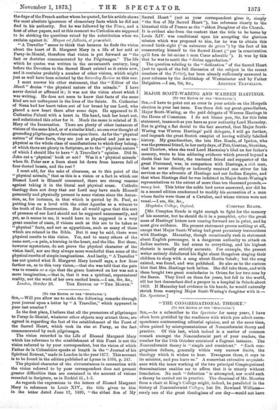MAJOR SCOTT-WARING AND WARREN HASTINGS.
[TO THE EDITOR OF THE "SPECTATOR."] SIR,—I have to point out an error in your article on the Morpeth election in your last issue. You there dub my great-grandfather, Major Scott-Waring, as the paid delegate of Warren Hastings in the House of Commons. I do not blame you, Sir, for this false statement, inasmuch as you have as your authority Lord Macaulay. But in giving a flat denial to the fact asserted, that Major Scott- Waring was Warren Hastings' paid delegate, I will go further, and impeach the great Scotch essayist of having wilfully falsified history. My grandmother, the late Mrs. Reade, of Ipsden, who was the personal friend, in her early days, of Pitt, Grattan, Sheridan, and Thurlow, when she read Lord Macaulay's libel on her father's memory, wrote to him adducing evidence which proved beyond a doubt that her father, the traduced friend and supporter of the great Proconsul, was, in comparison with Hastings, a rich man, that he never directly or indirectly received one stiver for his services as the advocate of Hastings and our Indian Empire, and that when Hastings died he was indebted to Major Scott-Waring's representatives to the extent of more than ten thousand pounds,.— money lent. This letter the noble lord never answered, nor did he in a second edition condescend to modify his accusation of a man whose faults were those of a Cavalier, and whose virtues were not venal.—I am, Sir, &c.,
[Mr. Compton Reade is right enough to fight for the memory of his ancestor, but he should do it in a pamphlet, after the great mass of Hastings' letters now coming forward are in print, and he must give evidence. His present statement proves nothing at all, except that Major Scott-Waring had great pecuniary transactions with Hastings. Macaulay, though occasionally rash in statement about English personages, is a dangerous authority to attack on Indian matters. He had access to everything, and his highest rhetoric is usually strictly accurate. For example, the present writer entirely disbelieved his flight about Bengalees singing their children to sleep with a song about Hestia Saheb ; but the song existed, was found, and was published. So also as to the curious hint that Mrs. Hastings took bribes. She did take them, and with them bought two great zemindaries in Orissa for her two sons by the Baron. They lived on them for years, but fell in the world, till her last descendant died a pauper in a hospital in Scinde about 1852. If Macaulay had evidence in his hands, he would naturally shrink from worrying Major Scott-Waring's daughter with it.— ED. Spectator.]


































 Previous page
Previous page